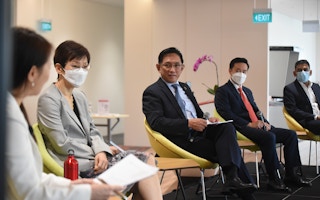Workers and the workplace have experienced profound changes since the outbreak of the Covid-19 pandemic over eighteen months ago. Companies are now faced with the challenge of reshaping their organisations to adapt to the new normal.
From redesigning office spaces that are efficient and reflect hybrid working patterns to equipping employees with the skills, culture and resources to navigate this transition, companies must pivot quickly into the reimagined future of work.
“With the pandemic, we’ve seen a move towards flexible work—whether it’s flexible place or time—but an important question is how do we look after the wellbeing of our employees?” asked Minister for Sustainability and the Environment, Grace Fu.
Speaking at the Ricoh Eco Action Day 2021 forum titled The future of work on Thursday, Fu said that companies need to find a sweet spot between connecting work teams that are in a physically distributed workplace, taking into account employee’s mental wellbeing and the ability to cope with a rupture to office work caused by months of lockdowns and social restrictions to stop the spread of Covid-19.
Held by multinational digital services company Ricoh Group and Eco-Business as part of Singapore’s longest-running environmental initiative, Eco Action Day, the dialogue brought together industry players, government representatives and sustainability experts to discuss the future of work amid the pandemic.
While the pandemic and the associated restrictions that have kept non-essential workers at home to stem the spread of the virus have temporarily reduced the carbon emissions of corporates by decreasing the energy used in office buildings, companies must redesign offices to ensure that carbon emissions stay low, said Fu.
Academic studies that have studied the impacts of the pandemic on working patterns indicate that people are likely to prefer working remotely for some of the time, making vast office spaces wasteful and unnecessary.
“We need to think about it on a systems level, how do we optimise resource use so that we accommodate the flexibility of work spaces? Companies can consider installing sensor detected lighting and air-conditioning, among other initiatives,” Fu added.
Ricoh Singapore has accelerated digital transformation at their workplace by creating an “agile workplace“, changing the layout of the office so that employees have flexibility in where they choose to work and resources are optimised.
“Human beings are social creatures by nature, and not all kind of work can be done alone,” said Shee Tse Koon, group executive and country head, DBS bank Singapore.
Research by the bank found that a 60-40 configuration works best for its employees, where employees are in the office 60 per cent of the time, working remotely for the remainder.
“We found that for DBS, we need interaction and collaboration. If people don’t spend time in the office, over time the company identity and culture might be lost,” See said.
“But we’re also conscious that we need to coach and guide people about the etiquette of this new way of working,” he added.
Importance of upskilling employees
Alongside flexible working conditions, the skills that are needed in the workforce are also quickly changing to combat future challenges.
Despite having one of the most digitally skilled workforces both regionally and globally, Singapore will need an additional 1.2 million digitally skilled workers by 2025 in order to keep up with the fast pace of technological advancements, revealed a report by AlphaBeta. That figure is approximately 55 per cent more than the number of digital workers that exist today.
Earlier this year, Amazon Web Services announced a national workforce development programme in June 2021 called Cloud Ready SG with AWS. “These skills are going to drive adoption of newer technologies, both for our customers and for the builders of innovative solutions,” said Vikram Rao, head of enterprise, Asean Amazon Web Services.
Sustainability skillsets will be another crucial area of focus, said Minister Fu. “Sustainability is not a sector or a vertical, it’s an important horizontal that will cut across many disciplines, sectors and professions.”
“Whether you are an engineer, a legal service provider, accountant or working in cloud technology, customers are expecting sustainable products and services,” she added.
Acknowledging that the financial sector will be disrupted by advances in tech or sustainability in the coming years, DBS has identified 7,300 existing employees across the bank to be upskilled or reskilled from this year.
The bank has therefore looked at the landscape of new technologies and evolving business practices to craft over 400 programmes that are focused on artificial intelligence and machine learning, among others, to retrain their staff, said See.
Second grant call for SG Eco Fund
During the event, Minister Grace Fu also announced the launch of a second grant call for the SG Eco-Fund. The S$50 million fund was set up in 2020 to support ground-up projects that involve the community and advance environmental sustainability in Singapore. Earlier this year, a total of 37 projects were awarded S$3.7 million in funding under the first grant call.
For the second grant call, a new funding category called Sprouts has been added, to spur more ground-up action. The Sprouts category offers a simpler application process for projects seeking funding of up to S$10,000. Applicants will only need to submit a pitch deck, rather than a written proposal, and present their ideas if shortlisted.
The SG Eco Fund is open to individuals, businesses and NGOs who wish to address a broad range of sustainability related issues, including climate change mitigation, waste reduction, and nature and biodiversity conservation.
Jessica Cheam, founder and managing director of Eco-Business, said: “As we emerge from the Covid-19 pandemic, there is an urgent need to ensure that recovery efforts for economic growth are aligned to our climate targets and wider societal needs. This transition also requires us to think about how we can help upskill our workforce to better respond to our future needs. This forum is a timely opportunity for us to delve deeper into the details as to how to get there.”










